Civil Law: Analyzing Rule of Law in Al-Kateb v Godwin Case
VerifiedAdded on 2023/01/10
|8
|2080
|22
Essay
AI Summary
This essay delves into the concept of the rule of law in Australia, examining its principles and application within the context of immigration detention. It primarily focuses on the landmark case of Al-Kateb v Godwin, analyzing the High Court's differing opinions on the constitutionality of indefinite detention for unlawful non-citizens. The essay explores the arguments presented by both the majority and minority judgments, highlighting the core legal principles at stake, including the balance between national security, individual rights, and the limitations on governmental power. It examines the historical context of immigration detention in Australia, comparing it with practices in other countries like the U.S., and ultimately assesses the implications of the Al-Kateb v Godwin decision on the rule of law and human rights within the Australian legal system. The essay further discusses the importance of an independent judicial system, equal application of laws, and the protection of individual liberties within the framework of the rule of law. The provided analysis includes relevant case laws and legislation, offering a comprehensive understanding of the subject matter.
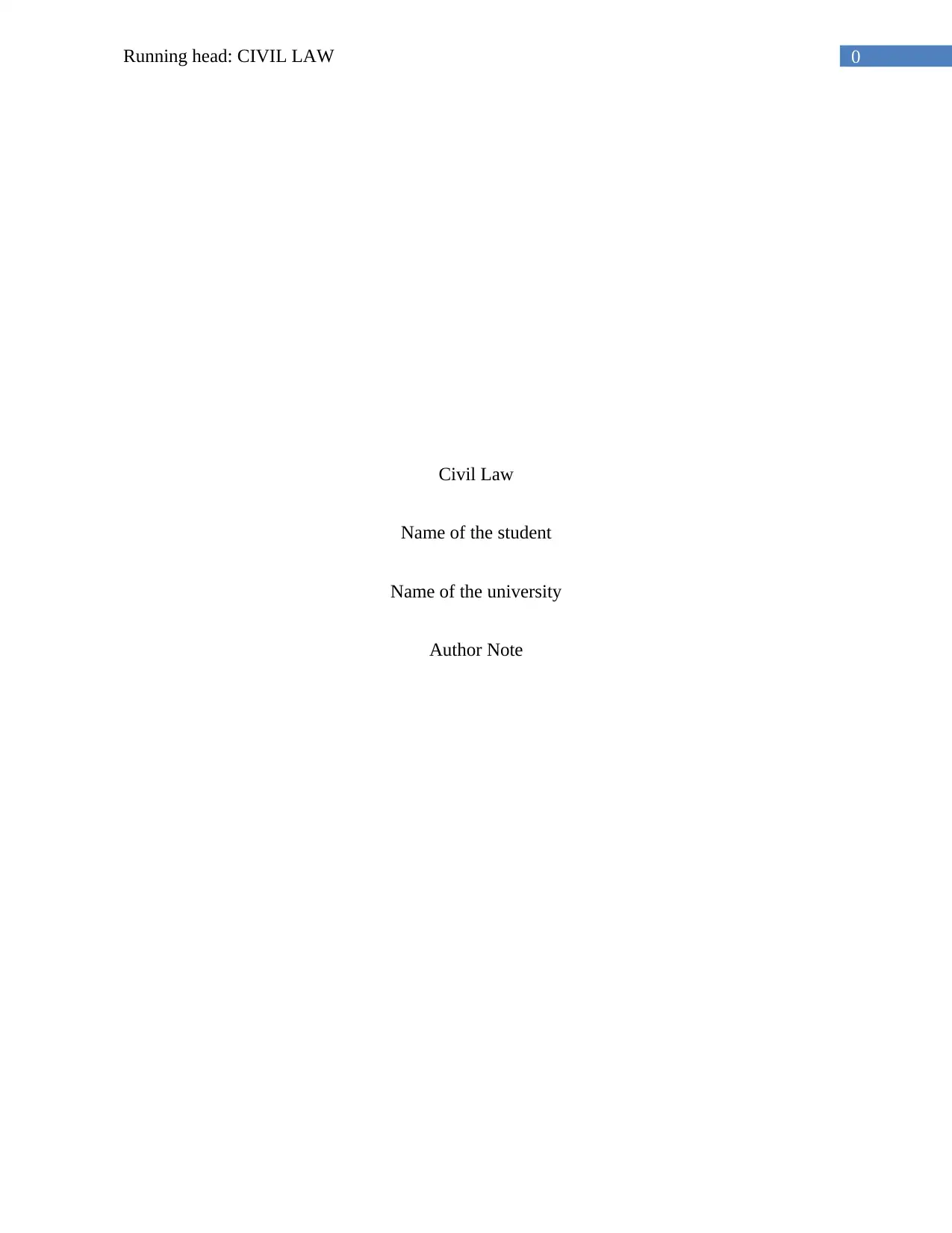
0Running head: CIVIL LAW
Civil Law
Name of the student
Name of the university
Author Note
Civil Law
Name of the student
Name of the university
Author Note
Paraphrase This Document
Need a fresh take? Get an instant paraphrase of this document with our AI Paraphraser
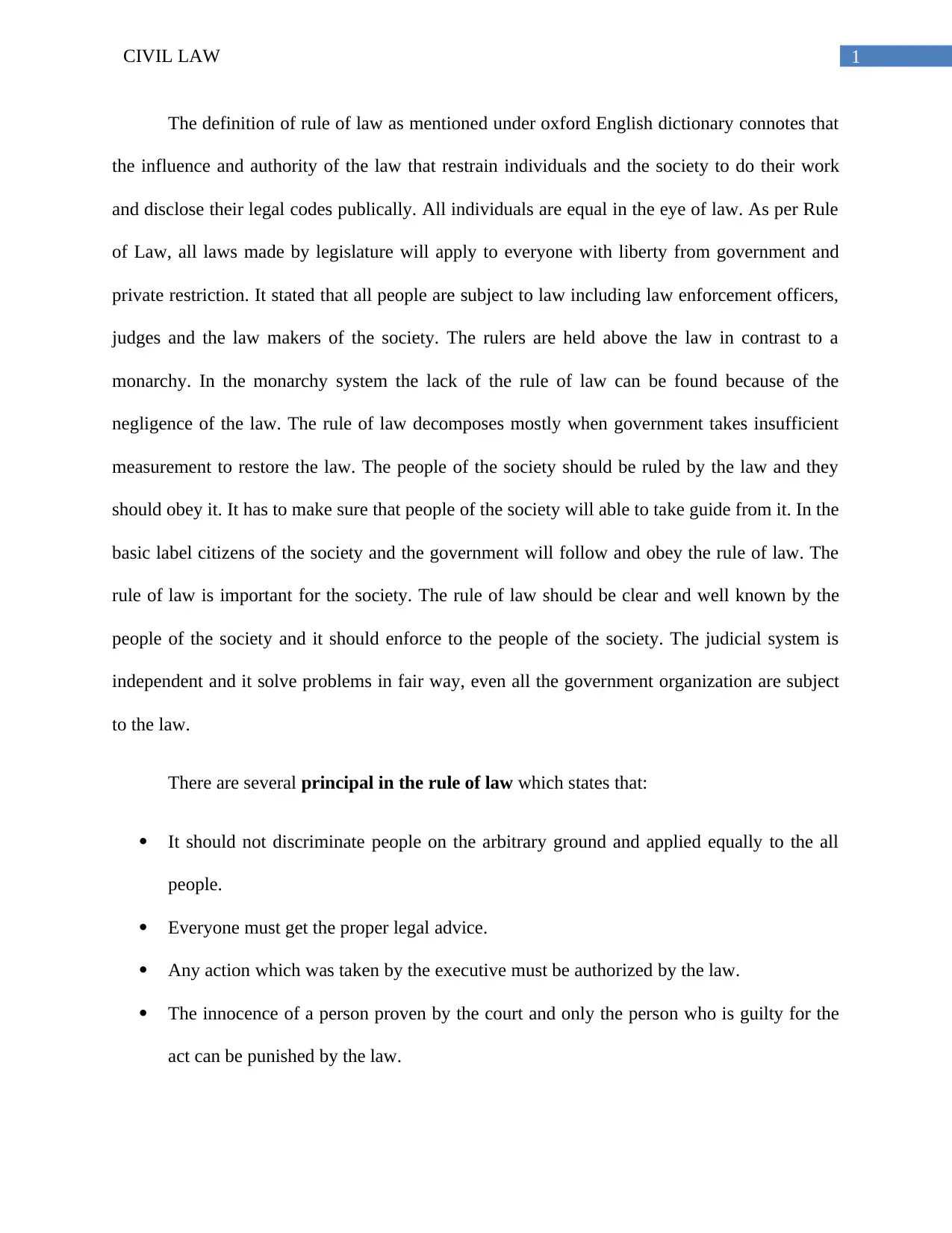
1CIVIL LAW
The definition of rule of law as mentioned under oxford English dictionary connotes that
the influence and authority of the law that restrain individuals and the society to do their work
and disclose their legal codes publically. All individuals are equal in the eye of law. As per Rule
of Law, all laws made by legislature will apply to everyone with liberty from government and
private restriction. It stated that all people are subject to law including law enforcement officers,
judges and the law makers of the society. The rulers are held above the law in contrast to a
monarchy. In the monarchy system the lack of the rule of law can be found because of the
negligence of the law. The rule of law decomposes mostly when government takes insufficient
measurement to restore the law. The people of the society should be ruled by the law and they
should obey it. It has to make sure that people of the society will able to take guide from it. In the
basic label citizens of the society and the government will follow and obey the rule of law. The
rule of law is important for the society. The rule of law should be clear and well known by the
people of the society and it should enforce to the people of the society. The judicial system is
independent and it solve problems in fair way, even all the government organization are subject
to the law.
There are several principal in the rule of law which states that:
It should not discriminate people on the arbitrary ground and applied equally to the all
people.
Everyone must get the proper legal advice.
Any action which was taken by the executive must be authorized by the law.
The innocence of a person proven by the court and only the person who is guilty for the
act can be punished by the law.
The definition of rule of law as mentioned under oxford English dictionary connotes that
the influence and authority of the law that restrain individuals and the society to do their work
and disclose their legal codes publically. All individuals are equal in the eye of law. As per Rule
of Law, all laws made by legislature will apply to everyone with liberty from government and
private restriction. It stated that all people are subject to law including law enforcement officers,
judges and the law makers of the society. The rulers are held above the law in contrast to a
monarchy. In the monarchy system the lack of the rule of law can be found because of the
negligence of the law. The rule of law decomposes mostly when government takes insufficient
measurement to restore the law. The people of the society should be ruled by the law and they
should obey it. It has to make sure that people of the society will able to take guide from it. In the
basic label citizens of the society and the government will follow and obey the rule of law. The
rule of law is important for the society. The rule of law should be clear and well known by the
people of the society and it should enforce to the people of the society. The judicial system is
independent and it solve problems in fair way, even all the government organization are subject
to the law.
There are several principal in the rule of law which states that:
It should not discriminate people on the arbitrary ground and applied equally to the all
people.
Everyone must get the proper legal advice.
Any action which was taken by the executive must be authorized by the law.
The innocence of a person proven by the court and only the person who is guilty for the
act can be punished by the law.
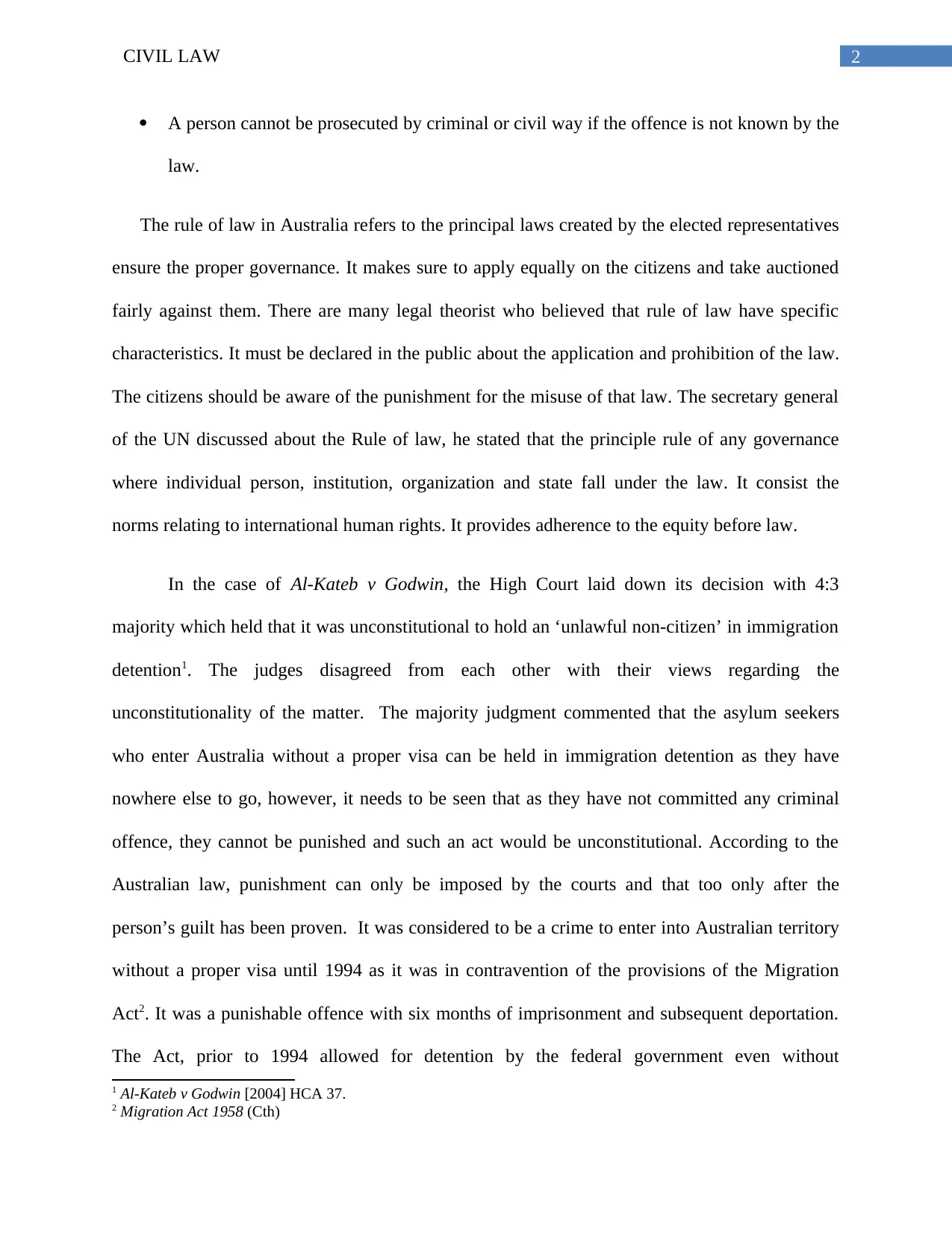
2CIVIL LAW
A person cannot be prosecuted by criminal or civil way if the offence is not known by the
law.
The rule of law in Australia refers to the principal laws created by the elected representatives
ensure the proper governance. It makes sure to apply equally on the citizens and take auctioned
fairly against them. There are many legal theorist who believed that rule of law have specific
characteristics. It must be declared in the public about the application and prohibition of the law.
The citizens should be aware of the punishment for the misuse of that law. The secretary general
of the UN discussed about the Rule of law, he stated that the principle rule of any governance
where individual person, institution, organization and state fall under the law. It consist the
norms relating to international human rights. It provides adherence to the equity before law.
In the case of Al-Kateb v Godwin, the High Court laid down its decision with 4:3
majority which held that it was unconstitutional to hold an ‘unlawful non-citizen’ in immigration
detention1. The judges disagreed from each other with their views regarding the
unconstitutionality of the matter. The majority judgment commented that the asylum seekers
who enter Australia without a proper visa can be held in immigration detention as they have
nowhere else to go, however, it needs to be seen that as they have not committed any criminal
offence, they cannot be punished and such an act would be unconstitutional. According to the
Australian law, punishment can only be imposed by the courts and that too only after the
person’s guilt has been proven. It was considered to be a crime to enter into Australian territory
without a proper visa until 1994 as it was in contravention of the provisions of the Migration
Act2. It was a punishable offence with six months of imprisonment and subsequent deportation.
The Act, prior to 1994 allowed for detention by the federal government even without
1 Al-Kateb v Godwin [2004] HCA 37.
2 Migration Act 1958 (Cth)
A person cannot be prosecuted by criminal or civil way if the offence is not known by the
law.
The rule of law in Australia refers to the principal laws created by the elected representatives
ensure the proper governance. It makes sure to apply equally on the citizens and take auctioned
fairly against them. There are many legal theorist who believed that rule of law have specific
characteristics. It must be declared in the public about the application and prohibition of the law.
The citizens should be aware of the punishment for the misuse of that law. The secretary general
of the UN discussed about the Rule of law, he stated that the principle rule of any governance
where individual person, institution, organization and state fall under the law. It consist the
norms relating to international human rights. It provides adherence to the equity before law.
In the case of Al-Kateb v Godwin, the High Court laid down its decision with 4:3
majority which held that it was unconstitutional to hold an ‘unlawful non-citizen’ in immigration
detention1. The judges disagreed from each other with their views regarding the
unconstitutionality of the matter. The majority judgment commented that the asylum seekers
who enter Australia without a proper visa can be held in immigration detention as they have
nowhere else to go, however, it needs to be seen that as they have not committed any criminal
offence, they cannot be punished and such an act would be unconstitutional. According to the
Australian law, punishment can only be imposed by the courts and that too only after the
person’s guilt has been proven. It was considered to be a crime to enter into Australian territory
without a proper visa until 1994 as it was in contravention of the provisions of the Migration
Act2. It was a punishable offence with six months of imprisonment and subsequent deportation.
The Act, prior to 1994 allowed for detention by the federal government even without
1 Al-Kateb v Godwin [2004] HCA 37.
2 Migration Act 1958 (Cth)
⊘ This is a preview!⊘
Do you want full access?
Subscribe today to unlock all pages.

Trusted by 1+ million students worldwide
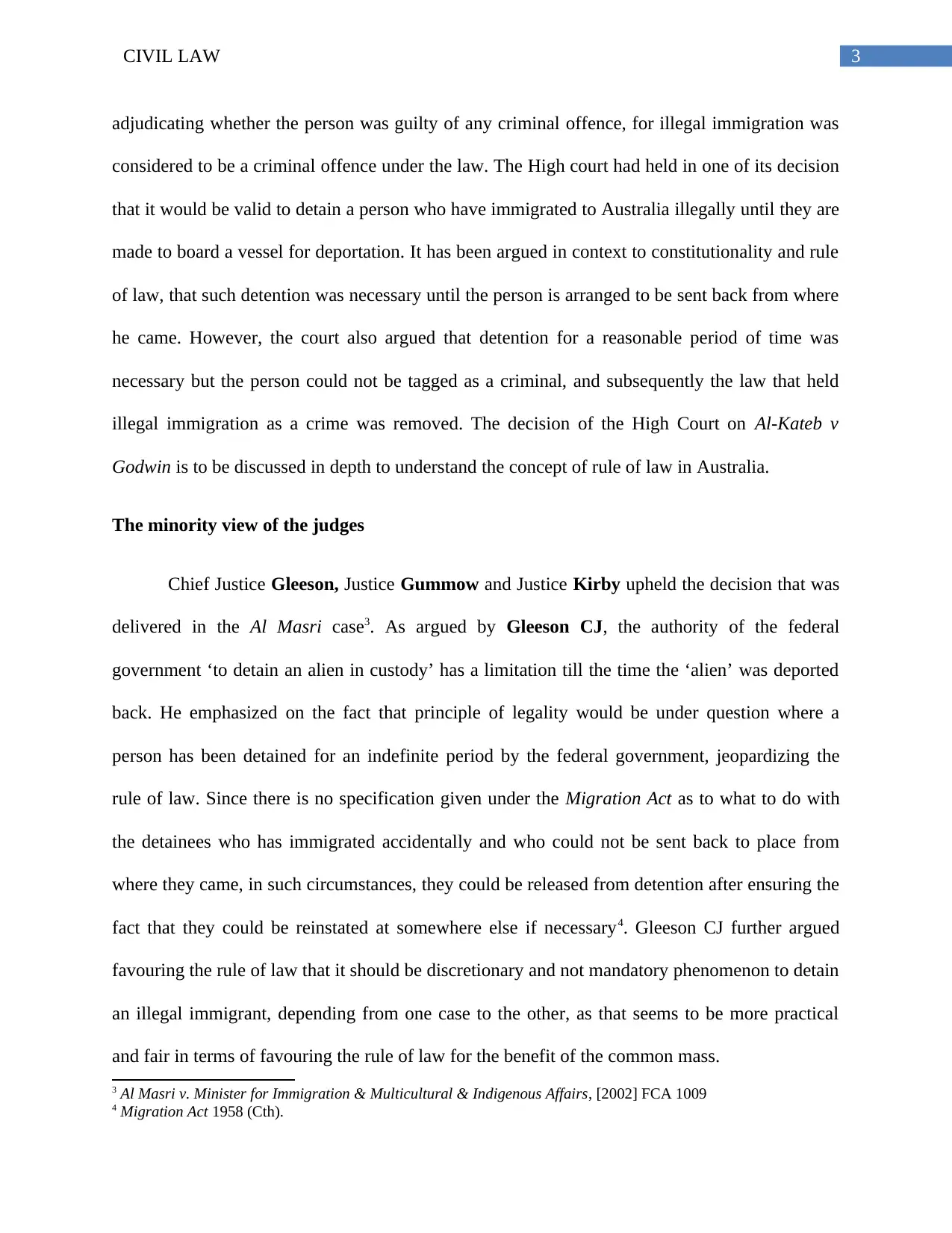
3CIVIL LAW
adjudicating whether the person was guilty of any criminal offence, for illegal immigration was
considered to be a criminal offence under the law. The High court had held in one of its decision
that it would be valid to detain a person who have immigrated to Australia illegally until they are
made to board a vessel for deportation. It has been argued in context to constitutionality and rule
of law, that such detention was necessary until the person is arranged to be sent back from where
he came. However, the court also argued that detention for a reasonable period of time was
necessary but the person could not be tagged as a criminal, and subsequently the law that held
illegal immigration as a crime was removed. The decision of the High Court on Al-Kateb v
Godwin is to be discussed in depth to understand the concept of rule of law in Australia.
The minority view of the judges
Chief Justice Gleeson, Justice Gummow and Justice Kirby upheld the decision that was
delivered in the Al Masri case3. As argued by Gleeson CJ, the authority of the federal
government ‘to detain an alien in custody’ has a limitation till the time the ‘alien’ was deported
back. He emphasized on the fact that principle of legality would be under question where a
person has been detained for an indefinite period by the federal government, jeopardizing the
rule of law. Since there is no specification given under the Migration Act as to what to do with
the detainees who has immigrated accidentally and who could not be sent back to place from
where they came, in such circumstances, they could be released from detention after ensuring the
fact that they could be reinstated at somewhere else if necessary4. Gleeson CJ further argued
favouring the rule of law that it should be discretionary and not mandatory phenomenon to detain
an illegal immigrant, depending from one case to the other, as that seems to be more practical
and fair in terms of favouring the rule of law for the benefit of the common mass.
3 Al Masri v. Minister for Immigration & Multicultural & Indigenous Affairs, [2002] FCA 1009
4 Migration Act 1958 (Cth).
adjudicating whether the person was guilty of any criminal offence, for illegal immigration was
considered to be a criminal offence under the law. The High court had held in one of its decision
that it would be valid to detain a person who have immigrated to Australia illegally until they are
made to board a vessel for deportation. It has been argued in context to constitutionality and rule
of law, that such detention was necessary until the person is arranged to be sent back from where
he came. However, the court also argued that detention for a reasonable period of time was
necessary but the person could not be tagged as a criminal, and subsequently the law that held
illegal immigration as a crime was removed. The decision of the High Court on Al-Kateb v
Godwin is to be discussed in depth to understand the concept of rule of law in Australia.
The minority view of the judges
Chief Justice Gleeson, Justice Gummow and Justice Kirby upheld the decision that was
delivered in the Al Masri case3. As argued by Gleeson CJ, the authority of the federal
government ‘to detain an alien in custody’ has a limitation till the time the ‘alien’ was deported
back. He emphasized on the fact that principle of legality would be under question where a
person has been detained for an indefinite period by the federal government, jeopardizing the
rule of law. Since there is no specification given under the Migration Act as to what to do with
the detainees who has immigrated accidentally and who could not be sent back to place from
where they came, in such circumstances, they could be released from detention after ensuring the
fact that they could be reinstated at somewhere else if necessary4. Gleeson CJ further argued
favouring the rule of law that it should be discretionary and not mandatory phenomenon to detain
an illegal immigrant, depending from one case to the other, as that seems to be more practical
and fair in terms of favouring the rule of law for the benefit of the common mass.
3 Al Masri v. Minister for Immigration & Multicultural & Indigenous Affairs, [2002] FCA 1009
4 Migration Act 1958 (Cth).
Paraphrase This Document
Need a fresh take? Get an instant paraphrase of this document with our AI Paraphraser
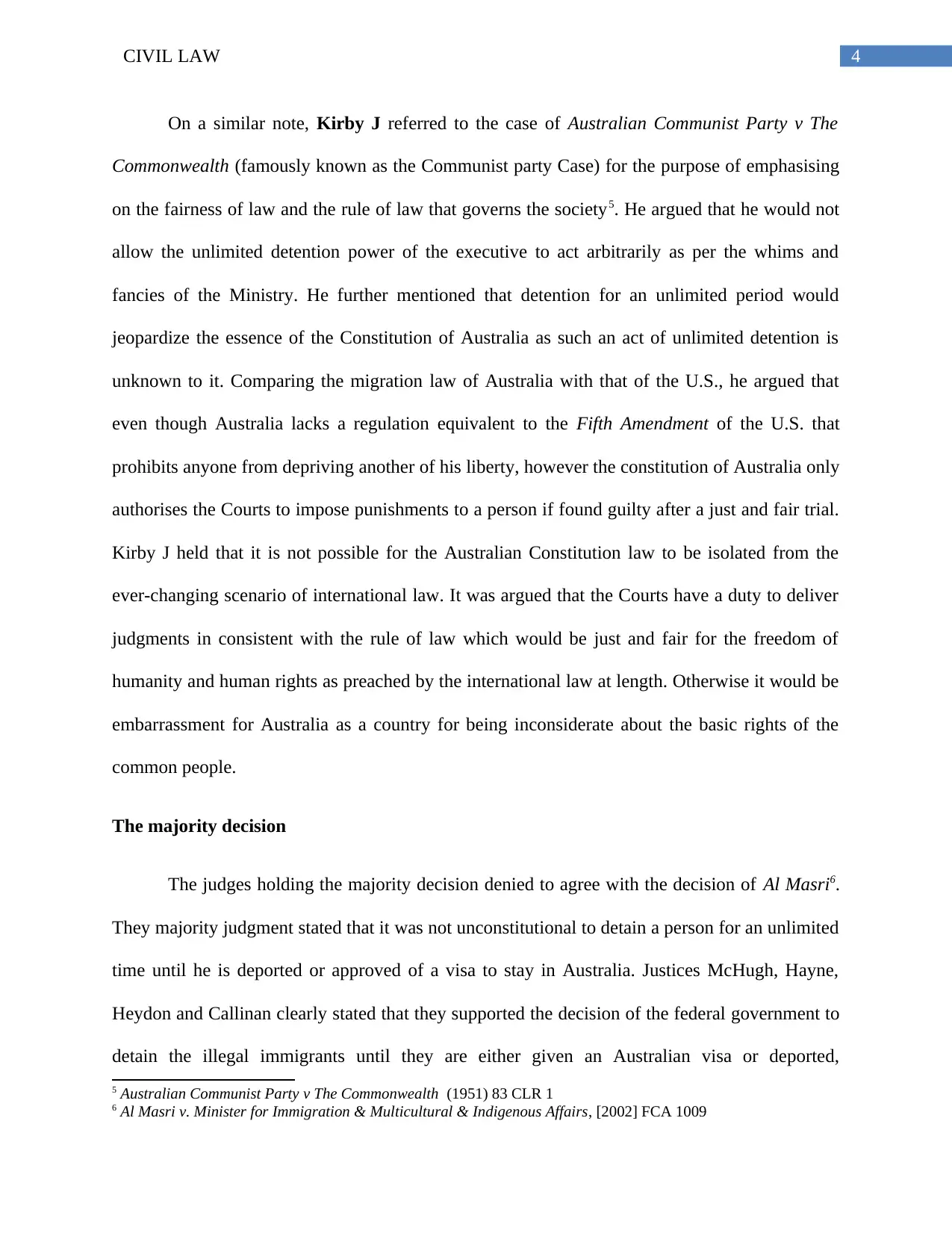
4CIVIL LAW
On a similar note, Kirby J referred to the case of Australian Communist Party v The
Commonwealth (famously known as the Communist party Case) for the purpose of emphasising
on the fairness of law and the rule of law that governs the society5. He argued that he would not
allow the unlimited detention power of the executive to act arbitrarily as per the whims and
fancies of the Ministry. He further mentioned that detention for an unlimited period would
jeopardize the essence of the Constitution of Australia as such an act of unlimited detention is
unknown to it. Comparing the migration law of Australia with that of the U.S., he argued that
even though Australia lacks a regulation equivalent to the Fifth Amendment of the U.S. that
prohibits anyone from depriving another of his liberty, however the constitution of Australia only
authorises the Courts to impose punishments to a person if found guilty after a just and fair trial.
Kirby J held that it is not possible for the Australian Constitution law to be isolated from the
ever-changing scenario of international law. It was argued that the Courts have a duty to deliver
judgments in consistent with the rule of law which would be just and fair for the freedom of
humanity and human rights as preached by the international law at length. Otherwise it would be
embarrassment for Australia as a country for being inconsiderate about the basic rights of the
common people.
The majority decision
The judges holding the majority decision denied to agree with the decision of Al Masri6.
They majority judgment stated that it was not unconstitutional to detain a person for an unlimited
time until he is deported or approved of a visa to stay in Australia. Justices McHugh, Hayne,
Heydon and Callinan clearly stated that they supported the decision of the federal government to
detain the illegal immigrants until they are either given an Australian visa or deported,
5 Australian Communist Party v The Commonwealth (1951) 83 CLR 1
6 Al Masri v. Minister for Immigration & Multicultural & Indigenous Affairs, [2002] FCA 1009
On a similar note, Kirby J referred to the case of Australian Communist Party v The
Commonwealth (famously known as the Communist party Case) for the purpose of emphasising
on the fairness of law and the rule of law that governs the society5. He argued that he would not
allow the unlimited detention power of the executive to act arbitrarily as per the whims and
fancies of the Ministry. He further mentioned that detention for an unlimited period would
jeopardize the essence of the Constitution of Australia as such an act of unlimited detention is
unknown to it. Comparing the migration law of Australia with that of the U.S., he argued that
even though Australia lacks a regulation equivalent to the Fifth Amendment of the U.S. that
prohibits anyone from depriving another of his liberty, however the constitution of Australia only
authorises the Courts to impose punishments to a person if found guilty after a just and fair trial.
Kirby J held that it is not possible for the Australian Constitution law to be isolated from the
ever-changing scenario of international law. It was argued that the Courts have a duty to deliver
judgments in consistent with the rule of law which would be just and fair for the freedom of
humanity and human rights as preached by the international law at length. Otherwise it would be
embarrassment for Australia as a country for being inconsiderate about the basic rights of the
common people.
The majority decision
The judges holding the majority decision denied to agree with the decision of Al Masri6.
They majority judgment stated that it was not unconstitutional to detain a person for an unlimited
time until he is deported or approved of a visa to stay in Australia. Justices McHugh, Hayne,
Heydon and Callinan clearly stated that they supported the decision of the federal government to
detain the illegal immigrants until they are either given an Australian visa or deported,
5 Australian Communist Party v The Commonwealth (1951) 83 CLR 1
6 Al Masri v. Minister for Immigration & Multicultural & Indigenous Affairs, [2002] FCA 1009
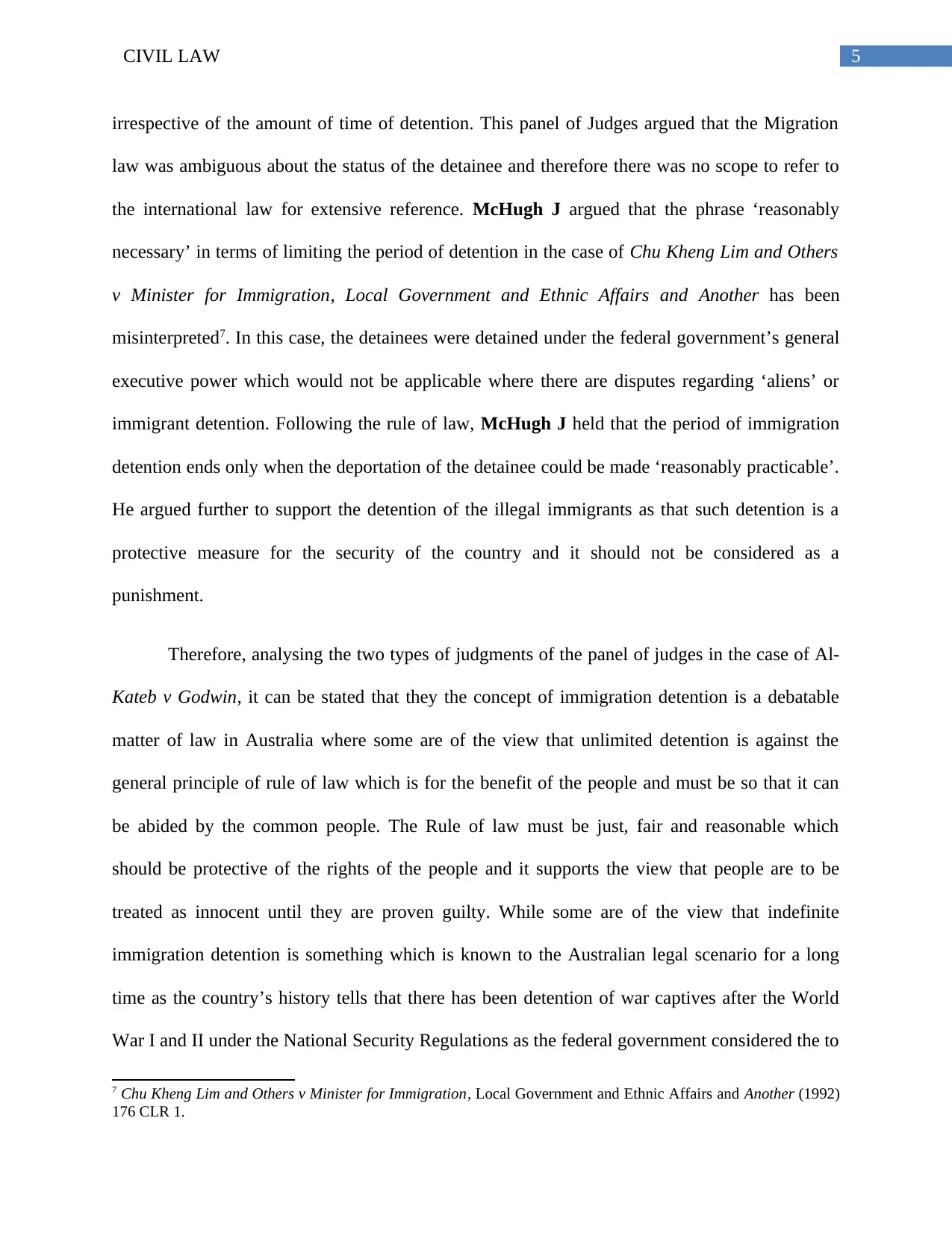
5CIVIL LAW
irrespective of the amount of time of detention. This panel of Judges argued that the Migration
law was ambiguous about the status of the detainee and therefore there was no scope to refer to
the international law for extensive reference. McHugh J argued that the phrase ‘reasonably
necessary’ in terms of limiting the period of detention in the case of Chu Kheng Lim and Others
v Minister for Immigration, Local Government and Ethnic Affairs and Another has been
misinterpreted7. In this case, the detainees were detained under the federal government’s general
executive power which would not be applicable where there are disputes regarding ‘aliens’ or
immigrant detention. Following the rule of law, McHugh J held that the period of immigration
detention ends only when the deportation of the detainee could be made ‘reasonably practicable’.
He argued further to support the detention of the illegal immigrants as that such detention is a
protective measure for the security of the country and it should not be considered as a
punishment.
Therefore, analysing the two types of judgments of the panel of judges in the case of Al-
Kateb v Godwin, it can be stated that they the concept of immigration detention is a debatable
matter of law in Australia where some are of the view that unlimited detention is against the
general principle of rule of law which is for the benefit of the people and must be so that it can
be abided by the common people. The Rule of law must be just, fair and reasonable which
should be protective of the rights of the people and it supports the view that people are to be
treated as innocent until they are proven guilty. While some are of the view that indefinite
immigration detention is something which is known to the Australian legal scenario for a long
time as the country’s history tells that there has been detention of war captives after the World
War I and II under the National Security Regulations as the federal government considered the to
7 Chu Kheng Lim and Others v Minister for Immigration, Local Government and Ethnic Affairs and Another (1992)
176 CLR 1.
irrespective of the amount of time of detention. This panel of Judges argued that the Migration
law was ambiguous about the status of the detainee and therefore there was no scope to refer to
the international law for extensive reference. McHugh J argued that the phrase ‘reasonably
necessary’ in terms of limiting the period of detention in the case of Chu Kheng Lim and Others
v Minister for Immigration, Local Government and Ethnic Affairs and Another has been
misinterpreted7. In this case, the detainees were detained under the federal government’s general
executive power which would not be applicable where there are disputes regarding ‘aliens’ or
immigrant detention. Following the rule of law, McHugh J held that the period of immigration
detention ends only when the deportation of the detainee could be made ‘reasonably practicable’.
He argued further to support the detention of the illegal immigrants as that such detention is a
protective measure for the security of the country and it should not be considered as a
punishment.
Therefore, analysing the two types of judgments of the panel of judges in the case of Al-
Kateb v Godwin, it can be stated that they the concept of immigration detention is a debatable
matter of law in Australia where some are of the view that unlimited detention is against the
general principle of rule of law which is for the benefit of the people and must be so that it can
be abided by the common people. The Rule of law must be just, fair and reasonable which
should be protective of the rights of the people and it supports the view that people are to be
treated as innocent until they are proven guilty. While some are of the view that indefinite
immigration detention is something which is known to the Australian legal scenario for a long
time as the country’s history tells that there has been detention of war captives after the World
War I and II under the National Security Regulations as the federal government considered the to
7 Chu Kheng Lim and Others v Minister for Immigration, Local Government and Ethnic Affairs and Another (1992)
176 CLR 1.
⊘ This is a preview!⊘
Do you want full access?
Subscribe today to unlock all pages.

Trusted by 1+ million students worldwide
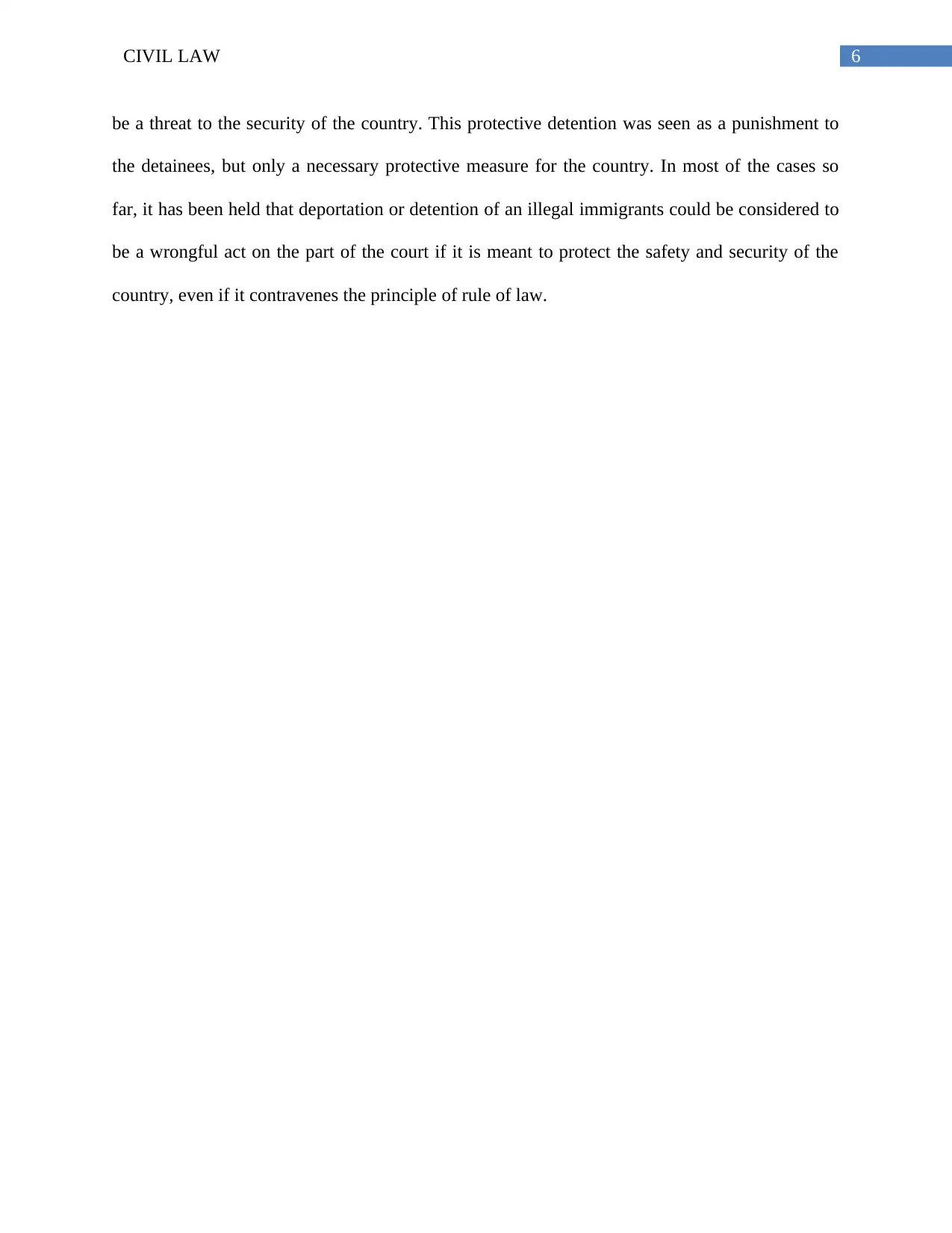
6CIVIL LAW
be a threat to the security of the country. This protective detention was seen as a punishment to
the detainees, but only a necessary protective measure for the country. In most of the cases so
far, it has been held that deportation or detention of an illegal immigrants could be considered to
be a wrongful act on the part of the court if it is meant to protect the safety and security of the
country, even if it contravenes the principle of rule of law.
be a threat to the security of the country. This protective detention was seen as a punishment to
the detainees, but only a necessary protective measure for the country. In most of the cases so
far, it has been held that deportation or detention of an illegal immigrants could be considered to
be a wrongful act on the part of the court if it is meant to protect the safety and security of the
country, even if it contravenes the principle of rule of law.
Paraphrase This Document
Need a fresh take? Get an instant paraphrase of this document with our AI Paraphraser
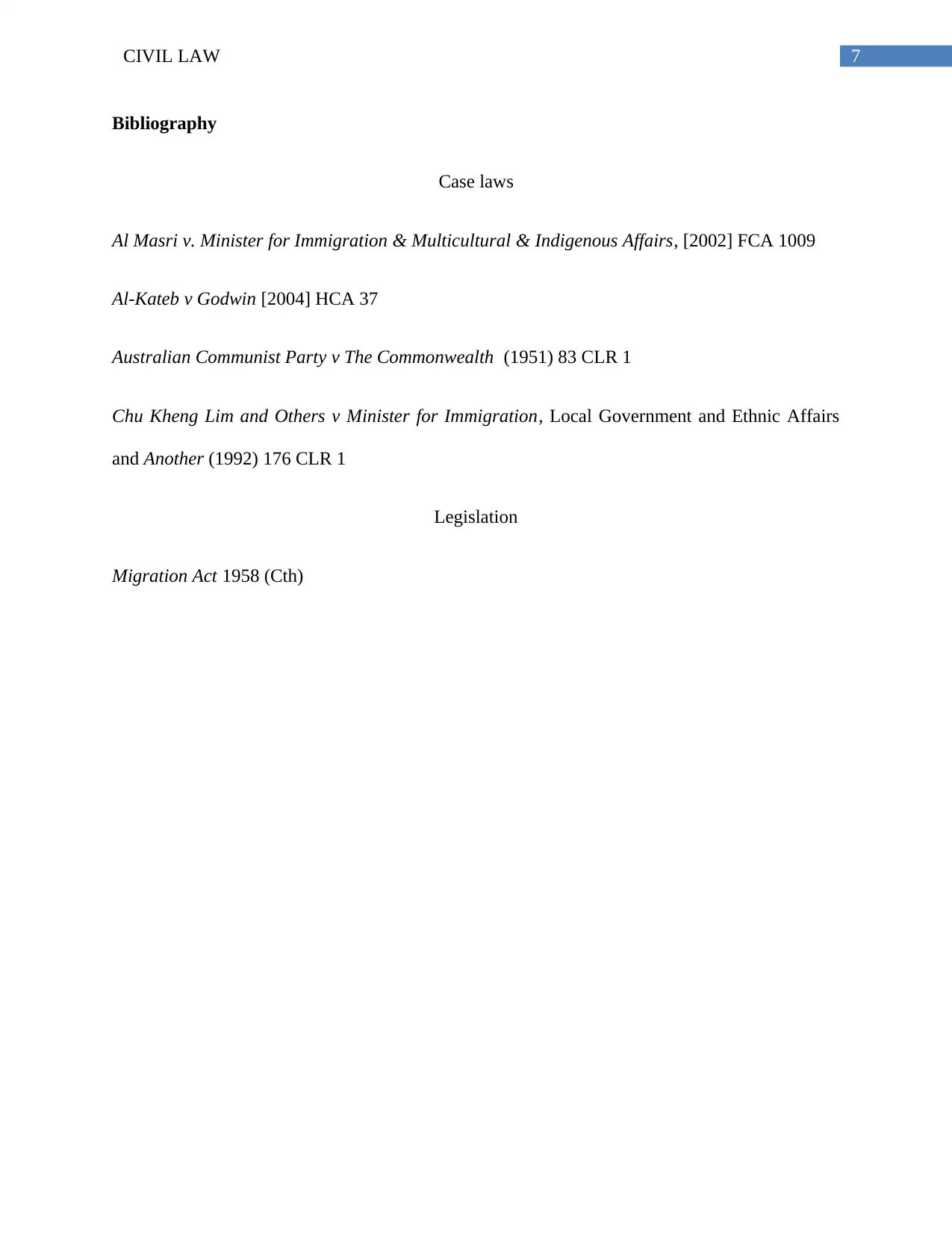
7CIVIL LAW
Bibliography
Case laws
Al Masri v. Minister for Immigration & Multicultural & Indigenous Affairs, [2002] FCA 1009
Al-Kateb v Godwin [2004] HCA 37
Australian Communist Party v The Commonwealth (1951) 83 CLR 1
Chu Kheng Lim and Others v Minister for Immigration, Local Government and Ethnic Affairs
and Another (1992) 176 CLR 1
Legislation
Migration Act 1958 (Cth)
Bibliography
Case laws
Al Masri v. Minister for Immigration & Multicultural & Indigenous Affairs, [2002] FCA 1009
Al-Kateb v Godwin [2004] HCA 37
Australian Communist Party v The Commonwealth (1951) 83 CLR 1
Chu Kheng Lim and Others v Minister for Immigration, Local Government and Ethnic Affairs
and Another (1992) 176 CLR 1
Legislation
Migration Act 1958 (Cth)
1 out of 8
Related Documents
Your All-in-One AI-Powered Toolkit for Academic Success.
+13062052269
info@desklib.com
Available 24*7 on WhatsApp / Email
![[object Object]](/_next/static/media/star-bottom.7253800d.svg)
Unlock your academic potential
Copyright © 2020–2025 A2Z Services. All Rights Reserved. Developed and managed by ZUCOL.





